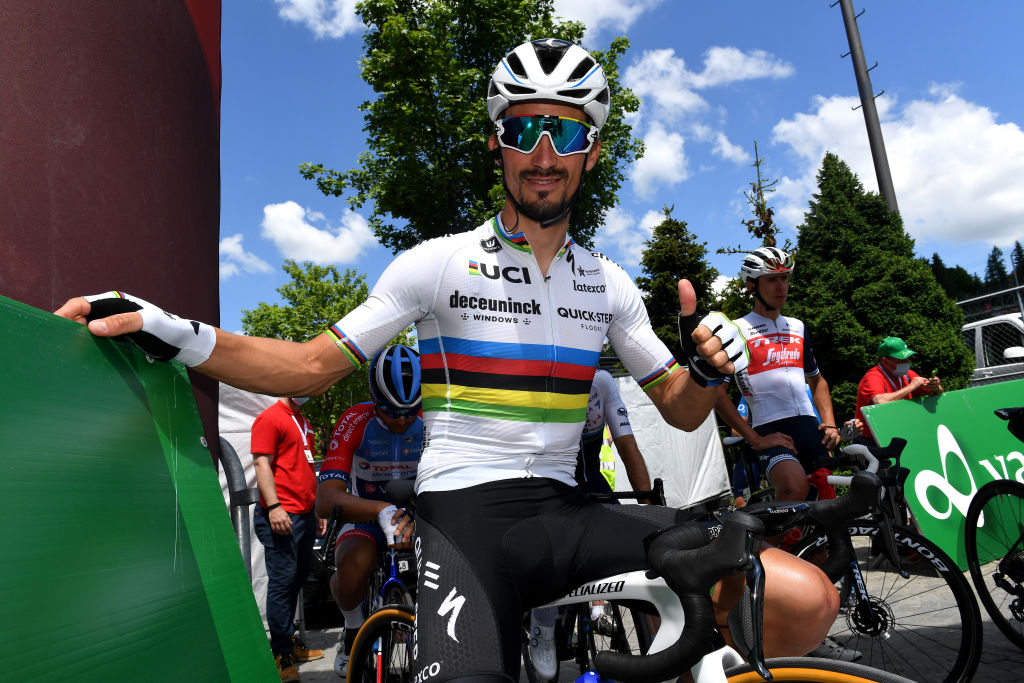Julian Alaphilippe: Winning Tour de France opener will take a 'very violent effort'
World champion takes aim at tough opening stage to Landerneau

After striking early in each of the past two editions of the Tour de France, Julian Alaphilippe (Deceuninck-QuickStep) sees little point in hiding his ambition this time around. The opening days of the 2021 race seem to have been designed with his qualities as a puncheur in mind, and the Frenchman will hope to swap his rainbow jersey for the maillot jaune in Landerneau on Saturday evening.
In 2019, Alaphilippe won in Epernay to take yellow on stage 3. Last August, he did the same on stage 2 in Nice. This time out, the finale atop the category 3 Côte de la Fosse aux Loups presents the world champion with a chance to seize yellow at the first time of asking. 24 hours later, meanwhile, there is another opportunity for puncheurs on stage 2 to Mûr-de-Bretagne.
“I’ve just reconnoitred the first stage, and it’s a really nice finale, it’s harder than I had imagined. It was very important to recon those last kilometres,” said Alaphilippe, who reckoned the finish at Landerneau is tougher than that at Mûr-de-Bretagne.
“I find the finishing climb on stage 1 very hard, because after the steep part, it doesn’t descend and that’s often what hurts the legs the most. I think there are people who’ll be surprised.”
In the early part of the season, Alaphilippe appeared to be locked in a running battle with Wout van Aert (Jumbo-Visma) and Mathieu van der Poel (Alpecin-Fenix), and that trio will race together this weekend for the first time since the Tour of Flanders. All three will have designs on the opening stage.
“It will suit Mathieu van der Poel and Wout van Aert, too, even though it’s a very hard finale, because you never know what to expect with riders like them,” Alaphilippe said. "It will be a very interesting finale. Whoever wins on Saturday will have to make a very violent effort, and they’re riders who can hurt themselves on stages like that.”
Mûr-de-Bretagne played a role in Alaphilippe’s development as a young rider. Fifth place behind Reinardt Janse van Rensburg there at the 2012 Tour de Bretagne opened the young Alaphilippe’s eyes to his possibilities on such terrain. “It was one of my first 2.2 races, and I wanted to do a good result. It was the moment where my team discovered I had capacities as a puncheur,” said Alaphilippe.
Get The Leadout Newsletter
The latest race content, interviews, features, reviews and expert buying guides, direct to your inbox!
His remarkable spell after taking yellow in Epernay two years ago, meanwhile, was the moment where Alaphilippe seemed to confirm his aptitude as a Grand Tour contender. He wore the maillot jaune for 14 days, won the time trial in Pau and eventually reached Paris in fifth place overall.
Last September, Alaphilippe preferred to use the Tour to build towards the Imola Worlds, but he has been climbing strongly in the run-up this year’s event. He lay third overall ahead at the Tour de Suisse when he pulled out ahead of the final stage to attend the birth of his son.
Yet while this Tour, with its dearth of finishes at altitude, appears to suit Alaphilippe, he downplayed the idea that he had designs on a high overall finish in Paris. The 29-year-old insisted that he would only take stock of his long-term outlook after the stage 5 time trial to Laval.
“I don’t know if it’s perfectly tailored for me but it’s an open parcours all the same, with not a lot of summit finishes. I have looked at it a little bit, but I want to focus on the opening stages and then take stock,” said Alaphilippe.
“You have to take it day by day. I’ve said it before and I’ll say it again: we haven’t come here with a team built around me and with the aim of the podium or overall victory. We have ambitions to win stages, give our maximum and then see how the race unfolds.
"The first week will be important to make a first assessment and after that I’ll see what’s possible. You have to be clear-headed and aware that the scenario of 2019, with 14 days in yellow, is really difficult to reproduce. I’ll give the maximum and see where that takes me.”

Barry Ryan was Head of Features at Cyclingnews. He has covered professional cycling since 2010, reporting from the Tour de France, Giro d’Italia and events from Argentina to Japan. His writing has appeared in The Independent, Procycling and Cycling Plus. He is the author of The Ascent: Sean Kelly, Stephen Roche and the Rise of Irish Cycling’s Golden Generation, published by Gill Books.